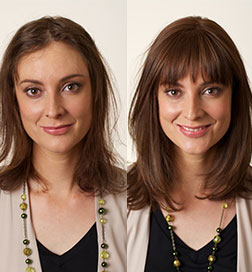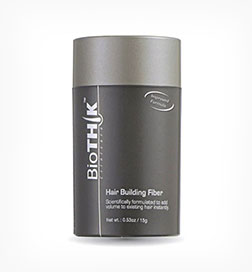Hair loss is a very natural occurence– every day you lose some hair to your hairbrush, find some hair on your shower drain, and even have some of them end up on your sheets and all over your carpet. But when you start losing hair in larger-than-normal clumps and experience very evident hair thinning, you may be experiencing a more serious hair loss problem.
Severe hair loss and thinning hair is a problem that’s experienced not only by men, but by women as well. Female hair loss can be caused by a number of things that can generally be sorted into two types: genetic and reactive.
Genetic Hair Loss
Genetic hair loss is hair loss that’s a result of a genetic predisposition. If hair loss runs in the family, there’s a definite probability that you could experience it as well. This type of hair loss usually occurs gradually with aging and happens in a predictable pattern. For women this usually means thinning hair due to the hair follicles gradually shrinking to produce finer and shorter hairs with every growth cycle. For some, eventually the hair follicles stop growing hair altogether.
This hereditary condition of female pattern hair loss can happen to about 50% of women, mostly in their 50s or 60s, but it can also happen at any age.
Reactive Hair Loss
Reactive hair loss is hair loss that’s been caused by a trigger and not a genetic predisposition. This trigger can be an internal imbalance, or a mistreatment of the hair.
Below are some of the most common causes of reactive hair loss in women:
- Hormonal imbalance – Hormones play a significant role in regulating the hair growth cycle, so it’s not surprising that any hormonal change can cause hair loss. Hormonal changes can be due to pregnancy and childbirth, menopause and thyroid problems.
- Medical conditions, medications and treatments – Scalp infections, medical conditions like alopecia areata, anaemia, and the hair-pulling disorder trichotillomania are just some of the conditions that can lead to significant hair loss. Radiation therapy as well as certain drugs, like those used to treat arthritis, depression and heart problems also have hair loss as a side effect.
- Stress – Stress can affect the body in a number of very negative ways. It can affect the scalp by raising the level of androgens (male hormones) in the body, which can cause hair loss. It may also trigger other problems, such as dandruff and abnormal eating habits that can all contribute to increased hair loss.
- Nutrient deficiencies – When you don’t eat well you don’t get enough nutrients, and without the right amount of certain nutrients you could end up losing more hair. One of the most common causes of hair loss in women is iron deficiency, as iron is essential for producing hair cell protein. Another nutrient that your hair needs is vitamin B12. The lack of vitamin B12 can affect the health of your blood cells, which are responsible for carrying oxygen to your tissues and that of course, includes your scalp.
- Sudden weight loss – This cause is closely connected to nutrient deficiency. When weight loss is done in a sudden and unhealthy manner, the body is depleted of certain nutrients necessary for healthy hair growth, causing hair to fall out.
- Certain hairstyles and treatments – Constant hair colouring, chemical treatments, blow drying, ironing, bad brushing and even aggressive towel drying can all lead to increased hair loss. Some hairstyles, such as cornrows or tight braids can also cause hair loss.
So What Can You Do About It?
Most reactive hair loss can be treated or prevented with a few simple lifestyle changes:
- Have a well-balanced diet – In order to keep growing healthy hair, you need to have a healthy diet. Make sure you eat a good amount of protein-rich foods, as hair is essentially made of protein. Ideally you should have a palm-sized portion (around 120g) of protein at breakfast and lunch. Also make sure you get enough iron, vitamin B12 and other vitamins and minerals. You could take a supplement to make sure you have enough of these nutrients daily.
- Style smart – Avoid the tight braids, messy topknots and other hairstyles that place stress on your strands. Also limit your use of chemical dyes, heavy styling creams and serums.
- Be gentle with your hair – Wash and brush your hair with care. Detangle strands starting from the bottom using a wide-toothed comb, and avoid twisting, rubbing or pulling your hair. Also avoid using hot rollers, hair irons and blow dryers as these can damage and weaken your hair.
- Avoid medications that could cause hair loss – If these medications are necessary, ask your doctor if there are any other options you could try that won’t cause hair loss
- Don’t stress – Stressing can instigate and exacerbate a hair loss problem, so always try to keep your stress levels to a minimum. Approach problems with a level head, avoid sources of stress if you can, and always make time to engage in relaxing activities
Hair Loss Treatments for Women
If your hair loss is genetic or if it’s taking time for you to recover naturally from hair loss, there are several other solutions you can try. These include laser hair retention and regrowth therapy, cosmetic hair thickeners, hair transplants and more. Get in touch with Transitions Hair today to know more about these hair loss solutions.




